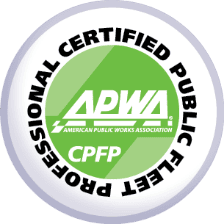Fleet Management Committee News
Gerald (Jerry) Byington CPFP, Chair
 As a retired fleet manager and public employee in many different roles for the past 40 years, holder of the Certified Public Fleet Professional (CPFP) certification, and chair of the Fleet Management Committee, I can attest that APWA is the place to go for education in all fleet management. Whether you are an aspiring fleet manager or an experienced fleet management professional looking to enhance your career, APWA has something for you! APWA’s Resource Center has more than 100 fleet-related webinars and resources to help guide you on your fleet management career path. Two of APWA’s most popular programs are:
As a retired fleet manager and public employee in many different roles for the past 40 years, holder of the Certified Public Fleet Professional (CPFP) certification, and chair of the Fleet Management Committee, I can attest that APWA is the place to go for education in all fleet management. Whether you are an aspiring fleet manager or an experienced fleet management professional looking to enhance your career, APWA has something for you! APWA’s Resource Center has more than 100 fleet-related webinars and resources to help guide you on your fleet management career path. Two of APWA’s most popular programs are:
Public Fleet Management Certificate – This is an eight-hour program designed for fleet managers, including new fleet managers or those who aspire to become fleet managers.
 Certified Public Fleet Professional (CPFP) – For the experienced public fleet management professional and for those with experience in the field who are interested in a credential that will promote a career in public fleet asset management services.
Certified Public Fleet Professional (CPFP) – For the experienced public fleet management professional and for those with experience in the field who are interested in a credential that will promote a career in public fleet asset management services.
Fleet is a big part of the public works team. It works collaboratively with many areas such as transportation, solid waste, and facilities just to name a few. APWA’s Fleet Management Committee is responsible for delivering valuable resources to its members and nonmembers alike to ensure fleets in the US and Canada not only serve public works but also their communities.
Consider joining us as a Fleet Management Committee Knowledge Team member to assist the committee in providing excellent, meaningful, cutting-edge training, and resources now and into the future. For additional information email education@apwa.org.
Public Works Benchmarks: Fleet
APWA conducted a pilot benchmarking survey in 2022 of 150 agencies across the United States. This document presents a detailed overview of key metrics pertaining to public works fleets, providing insights into the operational dynamics and resource utilization within these organizations.


